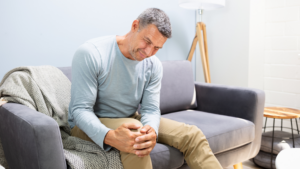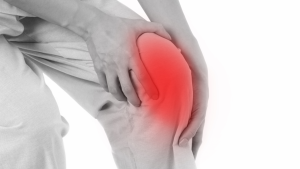Over 26% of Americans suffer from arthritis pain. And while there are medications for reducing arthritis pain, many patients want relief from their pain without taking pills.

Finding Relief from Your Arthritis Pain
Fortunately, treatment options are evolving, and arthritis patients can decide their treatment path alongside their physicians. Having options means creating a treatment plan that fits the patient’s lifestyle, their needs, wants, and corresponds to the severity of their pain.
Commonly, a combination of treatments is most effective for alleviating pain.
Treatment Options for Arthritis Pain
- Physical Therapy
Pain specialists often recommend physical therapy to ease arthritis pain. This type of exercise helps strengthen muscles, reduces joint stiffness, and improves range of motion. Your physical therapist will create an exercise plan to improve your ability to perform daily activities like walking, standing, climbing stairs, and getting in and out of the bathtub.
Physical therapy does not always reduce pain in all arthritis patients, but it can help strengthen the ligaments and muscles that support joints and bones causing pain.
- Transcutaneous electrical nerve stimulation (TENS)
All pain is transferred on small fibers of the nervous system. Those fibers travel from the affected area to the brain where pain is perceived. What Transcutaneous electrical nerve stimulation does is transmit a signal that masks the pain signals. The electrical current triggers the brain to release endorphins and enkephalins, opiate-like chemicals in the body that relieve pain.
TENS effectively treats any kind of arthritis pain.
- Trigger Point Injections
Trigger points are hard “knots” of painful muscles. When arthritis causes muscle pain, trigger points are a common symptom. These injections consist of an anesthesia and corticosteroid that is injected into the painful trigger points. Inserting a needle into the bundle of painful muscles allow the muscle tissue to go back to its normal structure.
- Heat/Cold Therapy
Heat and cold therapy is a temporary fix, but may relieve pain. Heat increases blood flow to the painful area and relaxes the muscles. Cold reduces swelling and inflammation. Cold sensations travel on large nerve fibers, whereas pain signals travel on small nerve fibers. This masks the pain signals.
Heat should be applied two or three times a day for 15-minute intervals. Cold compresses can be applied three or four times a day for 15-minute intervals or until the swelling has reduced.
- Mind-Body Relaxation Techniques
Learning techniques that help relax your body and your mind can help manage your pain. There is a psychological aspect of chronic pain that can be controlled through the use of meditation, breathing exercises, guided imagery, and relaxation. These methods help decrease stress, therefore decreasing inflammation and pain. Meditating for 20 minutes a day helps relax muscles that tense up with pain.
Breathing exercises have been associated with a decrease in depression, another common symptom of chronic pain like arthritis. Mind-body techniques work on focusing your mind and harnessing negative thoughts that can increase your perception of pain. Practicing meditation and regular relaxation techniques reduces the brain’s response to pain.
Progressive Pain Management has a team of experts skilled in treating all forms of chronic pain caused by arthritis and can help you find the relief you are looking for. Fill out the form below to get started.
Arthritis is a leading cause of pain and disability worldwide. In the United States alone, arthritis affects 50 million adults and over 300,000 children. Arthritis is not a single diagnosis, but in fact a collection of conditions that causes pain and aches related to joint paint.
Arthritis comes in a variety of forms and affects people differently – but the most common types are osteoarthritis and rheumatoid arthritis. And while over-the-counter medications and prescriptions can be effective, many patients do not want to take the risk of taking medication. There are many alternative methods for arthritis treatments that do not include taking pills or utilizing a prescription.

Finding Relief from Arthritis Pain
Treatments for Arthritis Pain Relief
-
The Right Pair of Shoes
According to a study, researchers found that in people with osteoarthritis, flexible shoes like flip-flops and sneakers reduce the force exerted on knee joints by an average of 13% compared to clogs and specialty shoes.
More force on joints equates more pain, so if by wearing flexible shoes there is less force, it should mean there is less pain. This is best to relieve pain in those who suffer from osteoarthritis of the knee and hip.
2. Aquatic Exercises
Water provides a resistance that increases the intensity of an exercise while also providing buoyancy that supports your bodyweight and relieving pressure on your joints.
Water aerobics and exercises have been proven to help improve range of motion, coordination, quality of life, and reduce body fat. While it may not be a long-term solution, patients who participate in aquatic exercises find relief from arthritis pain.
3. Yoga
Yoga, specifically Iyengar yoga that focuses on proper body alignment to support the body and relieve tension, is an excellent way to help relieve arthritis pain. Yoga is helpful in patients with rheumatoid arthritis in relieving pain, improving mood, and the ability to cope with their chronic arthritis pain.
- Supplements
Natural supplements are regularly being researched and approved for help in relieving pain associated with arthritis. Many supplements have properties that act as natural anti-inflammatories and the ability to stimulate neurotransmitters, like serotonin, which reduce pain receptors. Some supplements include:
- Indian Frankincense
- Tumeric
- Fish Oil / Omega 3
- Ginger
5. Massage
Regular massages help relieve tension and relax muscles and joints. Professional massages lower the body’s production of cortisol (the body’s stress hormone) and the neurotransmitter substance P, which is associated with pain. Massages help improve patients’ moods by boosting serotonin levels.
6. Therapy
Different kinds of therapy – exercise, physical, and cognitive behavioral therapies – are all beneficial to patients who suffer from arthritis pain. It improves your body’s strength, posture, range of motion, and functionality. Exercise is known to improve your mood, and when used in conjunction with cognitive behavioral therapy (CBT) it can be incredibly helpful in reducing pain.
CBT, or talk therapy, helps you identify pain points and makes you more aware of the anxieties and stress that is often associated with types of chronic pain like arthritis.
7. Sleep
Giving your body time to rest and relax at night is one of the most effective ways for it to heal and be free from pain. However, if you suffer from chronic pain, then you know that sleep is often disturbed and unachievable. Sleep deprivation can make pain worse and negatively affect your overall health.
Developing a strict schedule, setting alarms when it’s time to wake up and go to bed, help your body’s internal clock and help “reset” your natural sleep cycle. Napping disrupts the cycle, as well as trying to “catch up” on sleep on the weekends.
Being more active during the day can not only help reduce pain, but it will tire you out and make falling asleep easier. Studies have shown that patients who get seven or more hours of sleep a night are happier and healthier.
Arthritis can affect people in many different ways. If you experience any problems or have concerns about using at-home arthritis treatments, talk to your doctor. If you are currently taking medication for your arthritis pain, speak to your doctor before taking any supplements or undergoing any type of therapy for safety purposes.

